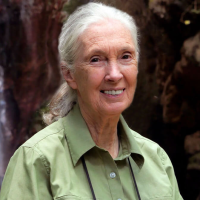Jane Goodall Explores the Links Between Conservation and Human Health
Humans share about 99 percent of our DNA structure with chimpanzees, a fact that according to Jane Goodall, we often forget at our own peril. In this Director's Forum, the world-renowned primatologist expressed an urgent concern for the survival of our planet and its animal kingdom, along with a sense of hope that humans have the capacity to find alternatives to our destructive ways.
Goodall focused her remarks on two burgeoning problems in Africa that are rapidly depleting wildlife populations: deforestation and the bushmeat trade. The deforestation around Gombe National Park, where she first studied the chimpanzees in 1960, is almost total. "It was very clear upon further investigation that the land around Gombe was being asked to support far more people than it possibly could," Goodall said.
In 1994, the Lake Tanganyika Catchment Reforestation and Education Project, or TACARE, was established to combat deforestation and poverty by focusing on community socio-economic development and sustainable natural resource management. Specifically, the program trains and enables villages to plant tree nurseries and to reclaim over-farmed land to make it fertile again. TACARE also provides education on primary health care and HIV/AIDS, and encourages women's education and economic empowerment. Education, Goodall said, is the first step towards "helping the people to understand that as the environment is destroyed, so their own life becomes increasingly hard and difficult."
An even greater threat to wildlife in Africa, according to Goodall, is the bushmeat trade, or the commercial hunting of wild animals for food. She explained how the logging companies opened up the forests by building roads that hunters now use to shoot practically any and all wildlife, including antelopes, monkeys, chimpanzees, elephants, and gorillas. They dry the meat in the sun and then sell the meat to the urban elite, who are willing to pay more for bushmeat than for more sustainable food like goats or chickens.
Goodall concluded her remarks by describing the success of Roots and Shoots, the Jane Goodall Institute's global environmental and humanitarian education program for youth. Now with more than 7500 groups-- from preschool through university-- in more than 90 countries around the world, the program seeks to foster respect and compassion for all living things, promote an understanding of all cultures and beliefs, and inspire each individual to take action in order to make the world a better place for the environment, animals, and the human community. "There is not much point in doing this conservation work, in talking about saving our forests--if we are not at the same time devoting huge amounts of energy to raising young people to be better stewards than we have been."
Speaker

Hosted By

Environmental Change and Security Program
The Environmental Change and Security Program (ECSP) explores the connections between environmental change, health, and population dynamics and their links to conflict, human insecurity, and foreign policy. Read more


Maternal Health Initiative
Housed within the Wilson Center's Environmental Change and Security Program, the Maternal Health Initiative (MHI) leads the Wilson Center’s work on maternal health, global health equity, and gender equality. Read more
